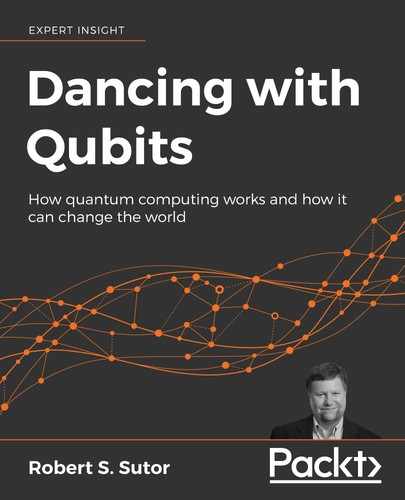12
Questions about the Future
We can only see a short distance ahead,
but we can see plenty there that needs to be done.
How will quantum computing evolve over the coming years and decades? It’s critical not to say that quantum computing will do this or that, but rather may. Until someone does this or that, it’s speculation, hype, or a work in progress.
Via a series of motivating questions, I give you a framework to check in on the progress of the full software, hardware, and systems stack. These questions also deal with how, where, and when you might start using, teaching, or learning about quantum computing.
The state of the art will be changing rapidly. Returning to these questions and their answers every few months will help you gauge what has been done and why it is significant. They will allow you to understand whether quantum is ready for you, and if you are ready for quantum.
Topics covered in this chapter
12.2 Applications and strategy
12.3 Access
12.4 Software
12.5 Hardware
12.6 Education
12.7 Resources
12.8 Summary
12.1 Ecosystem and community
‘‘Ecosystem’’ is an overused and often vague word regarding groups of people who have some connection to an activity. I now try to be more precise in describing what I consider the breadth of the quantum computing ecosystem. I touched upon some parts of the ecosystem above, especially in the education section.
The goal of the ecosystem is to reach Quantum Advantage, the point where quantum computing can do significantly better than classical computing on important problems for business, science, and government.
For the sections that follow, think about what role or roles you have or want to have in the quantum computing ecosystem and then answer those questions relevant to you.
- What role or roles do you play in the quantum computing ecosystem are you?
- Algorithm developer
- Business development / sales
- Business or technology executive
- Business partner
- Cloud access provider
- Communications
- Community leader or participant
- Consultant
- Development tools provider
- Educator
- Full stack provider
- Hardware provider
- Industry analyst
- Industry use case expert
- Journalist
- Marketing
- Quantum application software provider
- Quantum hardware engineer
- Quantum software engineer
- Quantum software platform provider
- Scientist or researcher
- Student
- Support
- Systems integrator
- Venture capitalist or other investor
- Other
To clarify some of these role definitions:
- Hardware provider – supplies the quantum computing hardware
- Software platform provider – supplies the development tools and runtime software
- Application software provider – supplies the top-level applications that implement industry use cases
- Cloud access provider – supplies the cloud services that allow you to use remote quantum computers
- Full stack provider – supplies all of the above
- How do you interact with other members of the quantum computing ecosystem doing similar work?
- How do you interact with other parts of the ecosystem who do complementary work?
- How could these interactions get started or be made more productive?
- In what ways must these interactions become broader and richer as quantum computing develops?
- Are you part of an open source community developing quantum computing software?
- What are you doing personally to improve the quality and reach of the quantum computing community?
- If you are part of a startup, how can vendors better support you?
- If you are an analyst or a consultant, how can you best get the information you need to advise your clients?
- How should we all work together to achieve Quantum Advantage faster?
12.2 Applications and strategy
What do we mean by a ‘‘quantum application’’? It’s not software where the only computer used is a quantum one. That is not possible today, nor will it be necessary or possible for many decades, or even centuries. Rather, a quantum application is a hybrid classical-quantum solution that use both kinds of hardware and software.
Industry use cases, as I touched upon briefly in chapter 1 , will drive the creation of these applications. Over the years, the definition of the use cases will change as we better understand how quantum computing systems can and can’t help us. Benchmarks will be important, but only in measuring progress.
Together with those in the other sections, these questions will help you think about use cases for quantum computing and your plan for matching them to quantum solutions:
- Where is your classical computing taking too long?
- Where is your classical computing too inaccurate?
- Do you currently use HPC, High Performance Computing?
- If so, what are the bottlenecks in your solutions?
- Can you pinpoint areas where there is an exponential growth of necessary memory or computation time?
- Is your application data intensive or computation intensive?
- In what ways do you want to scale the computation in your system?
- Do you want to do what you are doing now faster, or do you want greater computing capacity to examine more possibilities and scenarios?
- Are there use cases in industries similar to your own that are looking at pathways to using quantum computing?
- Are there proposed NISQ quantum solutions for your use cases or will you need fault tolerance? A ‘‘NISQ quantum solution’’ is one that can operate with noisy qubits and short depth circuits (section 11.1).
- How will quantum computing fit into your existing workflow?
- Do you understand your quantum strategy well enough so you know which applications will be possible in the short, medium, and long terms?
- Do you work with vendors, industry analysts, management consultations, and system integrators to hone your quantum strategy?
- What is their expertise in understanding the current state of quantum hardware and software?
- Have you established your quantum education, experimentation, and implementation roadmap?
12.3 Access
‘‘Access’’ refers to how you connect to a quantum computing system. Connecting via the cloud can give you all the benefits of cloud computing regarding security, elastic resources, and software and hardware upgrades.
- Can you get the quantum computing capacity you need through the cloud?
- What are your security requirements for such remote access?
- Do you require a special kind of hosted quantum cloud data center for legislative, national, or military reasons?
- Can you use a remote quantum computer in another country?
- From which countries can you and can you not access quantum computers?
- What are your quality of service requirements for quantum computing, including up time, prioritization, and scheduling?
- Will you need access to more than one quantum computer at a time?
- In terms of Quantum Volume, how powerful a machine, or machines, do you need?
- Does your quantum computing provider have a roadmap to provide you access to their newest and most powerful systems?
- Can you get free cloud access to smaller quantum computers and then move on to commercial quality systems?
- Can you access quantum computers on the same vendor cloud on which you run classical applications?
- Do you anticipate a need to own a quantum computer versus accessing one via the cloud?

12.4 Software
If a quantum computer is to be programmable, it must have software. More than that, your chosen system must have a full stack of development tools and runtime facilities.
- Do you prefer working with new, semi-proprietary languages for quantum computing or would you rather reuse existing skills in languages like Python?
- Does your staff already have software engineering talent in Python?
- Have you surveyed the current development platforms for quantum computing?
- Have you assessed the breadth of functionality and algorithms implemented in the User Libraries level of the stack?
- Do you need ready-made optimized circuits in the System Libraries level?
- Will you be implementing new circuits?

- Does the development environment include a visual circuit designer for implementing algorithms such as those shown in this book?
- What is the level of abstraction with which you can create circuits?
- Does the programming environment offer direct access to the operating characteristics of the hardware?
- Can you design new gates and directly control the qubit hardware in the Pulse level or its equivalent?
- Does the development environment and programming language only target quantum simulators?
- Can you write code and have it run on both quantum hardware and simulators?
- Is your quantum software development platform open source? What license is used?
- If so, is the software supported by a large, vibrant, and multidisciplinary group of developers?
- What documentation and media support is available to help you start developing?
- For how long has the software platform been under development?
- Is there a public roadmap for planned future development?
- What is the software development tool chain in your quantum platform?
- Does your platform contain an optimizing compiler to get the best performance of your application on the hardware?
- What facilities are there for debugging your code?
- How easily and graphically can you see and understand the results of your circuits?
12.5 Hardware
A quantum computing system needs real quantum computing hardware. While simulators may be useful for learning, experimenting, and debugging small problems, the sooner you use actual hardware, the quicker you’ll take advantage of its potential. You are not doing quantum computing if you are solely using classical hardware.
- Are you sure your vendor is providing you access to real quantum hardware, or is it only a simulator?
- Is the quantum hardware general purpose (also known as universal), or is it designed to solve only one kind of problem?
- Can your quantum hardware be used to solve problems significantly better than classical technologies?
- Does the choice of qubit technology make a difference to you?
- What qubit technology is producing systems with the best Quantum Volumes?

- How is qubit technology scaling?
- Can you use the same quantum software development environment to target different quantum hardware?
- Does your quantum computing system offer physical qubits, logical qubits, or both?
- Can your quantum hardware, with its associated software, be used to entangle many qubits?
- Are you confident that the provider of your quantum computing hardware will provide you with long-term support and continue to enhance the technology?
12.6 Education
I split the questions about education for quantum computing and coding between teaching or training, and learning.
Teaching
- Do you currently teach or plan to teach a class involving quantum computing?
- Do you teach a single class on the topic or do you teach parts of the subject in different classes?
- Where would you augment the following kinds of classes with quantum computing?
- Artificial Intelligence
- Chemistry
- Computer Science
- Engineering
- Materials Science
- Philosophy
- Physics
- Pure and Applied Mathematics
- Quantitative Economics
and Finance
- Do you supplement the material with hands-on homework or labs using a software development environment?
- Do your students download the development environment or use it on the cloud through a browser?
- Do you use a textbook, your own material, or both?
- Do you supplement your material with content, videos, and exercises found online?
- Are you part of a community developing teaching materials?
- How do you augment student activities in quantum computing outside the classroom?
- Do you yourself take online classes on quantum computing to learn how to better teach the subject?
Learning
- Have you taken a class on quantum computing in school, through your organization, or online?
- What classes have you taken that could have been extended with quantum computing content?
- Have you asked your teachers or professors to include that content?
- Are you willing to learn about quantum computing outside the classroom?
- Have you participated in a quantum computing hackathon at your school or in your organization?
- Are you willing to host such a hackathon, with help from a quantum computing vendor?
- Have you visited an exhibit about quantum computing at a science museum?
- How important is it to you to get badges for your resumé that show your proficiency in quantum computing?
- Do you know how to code, specifically Python? Python is one of the most commonly used programming language for scientific and AI applications.
- Are you interested in learning how to code quantum computing applications?
- Do you plan to do quantum computing research or software engineering, or is this just an interest of yours?

The author speaking at the Boston Museum of Science in April, 2019. Photo by Carol Lynn Alpert. Used with permission.
12.7 Resources
- Do you have staff in your organization to guide you in your quantum business and technical strategy?
- Is ‘‘quantum computing’’ part of the skills profile for your employees?
- What is your recruiting plan to build quantum expertise in your organization?
- Have you targeted colleges and universities which include quantum computing in their curricula for recruiting?
- Do you attend quantum computing conferences to recruit?
- Do you look for badges showing quantum computing proficiency for your employees and job applicants?
- Will you reimburse employees who take quantum computing classes or training programs?
- Are quantum computing conferences on the list of approved expenses for employees, including management?
- What new kinds of jobs will be created in your organization when quantum computing goes mainstream?
- Do you have staff with graduate degrees in physics who can code?
- Do you need help building out your skills and recruiting strategy?
- If you have one, is your Chief Technical Officer (CTO) ‘‘quantum savvy’’?
12.8 Summary
In this final chapter of the book, we examined questions that allow you to think about the development of quantum computing and how you can use it. The answers will help you gauge progress in the field. This will likely be uneven as temporary scientific and engineering roadblocks are discovered and then bypassed or overcome. You should revisit the questions and your answers at least every six months.
References
- [1]
-
Creative Commons. Creative Commons Attribution-NoDerivs 2.0 Generic (CC BY-ND 2.0) . url: https://creativecommons.org/licenses/by-nd/2.0/legalcode.
- [2]
-
A. M. Turing. In: Computers & Thought. Ed. by Edward A. Feigenbaum and Julian Feldman. MIT Press, 1995. Chap. Computing Machinery and Intelligence, pp. 11–35.
